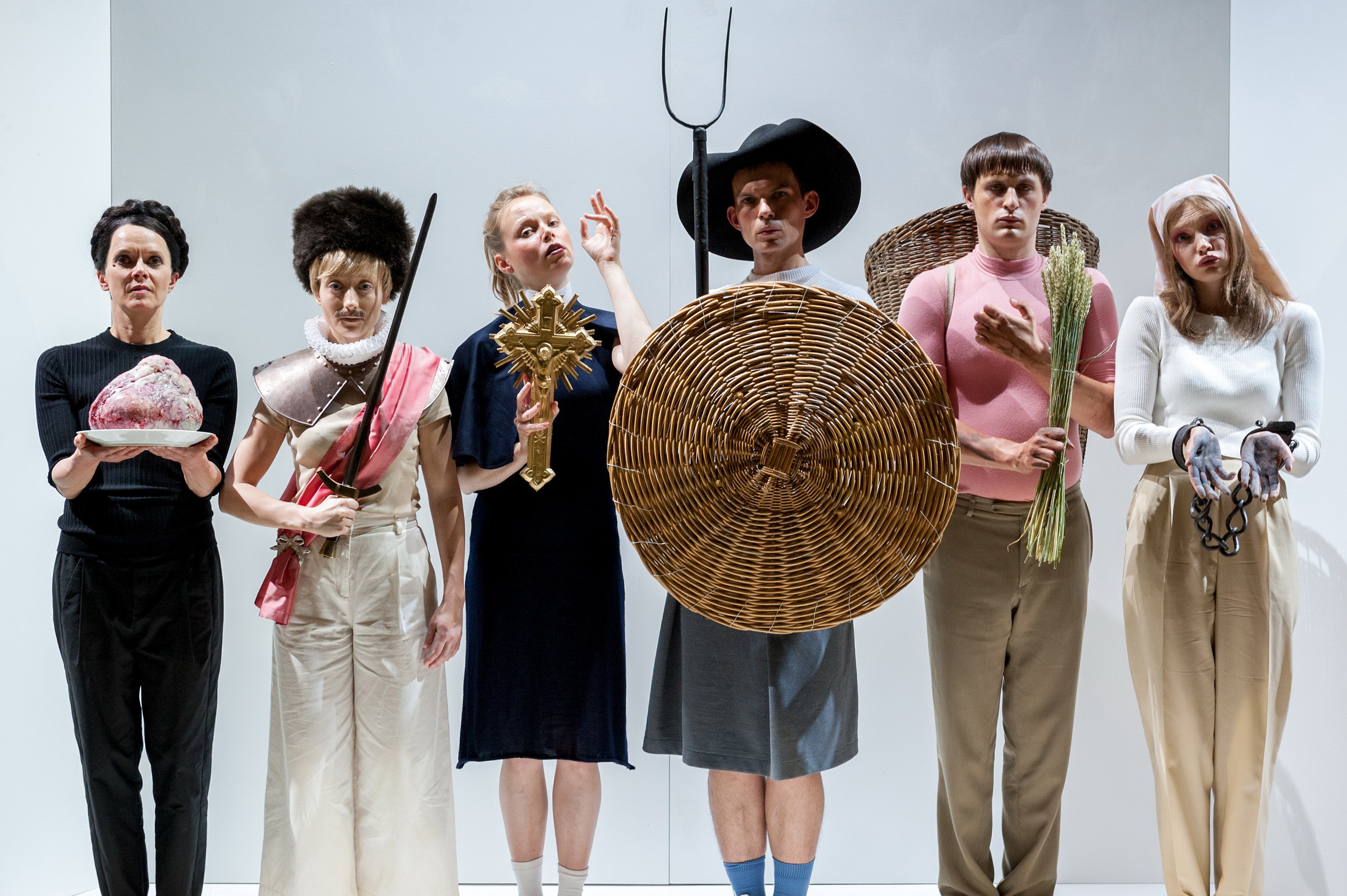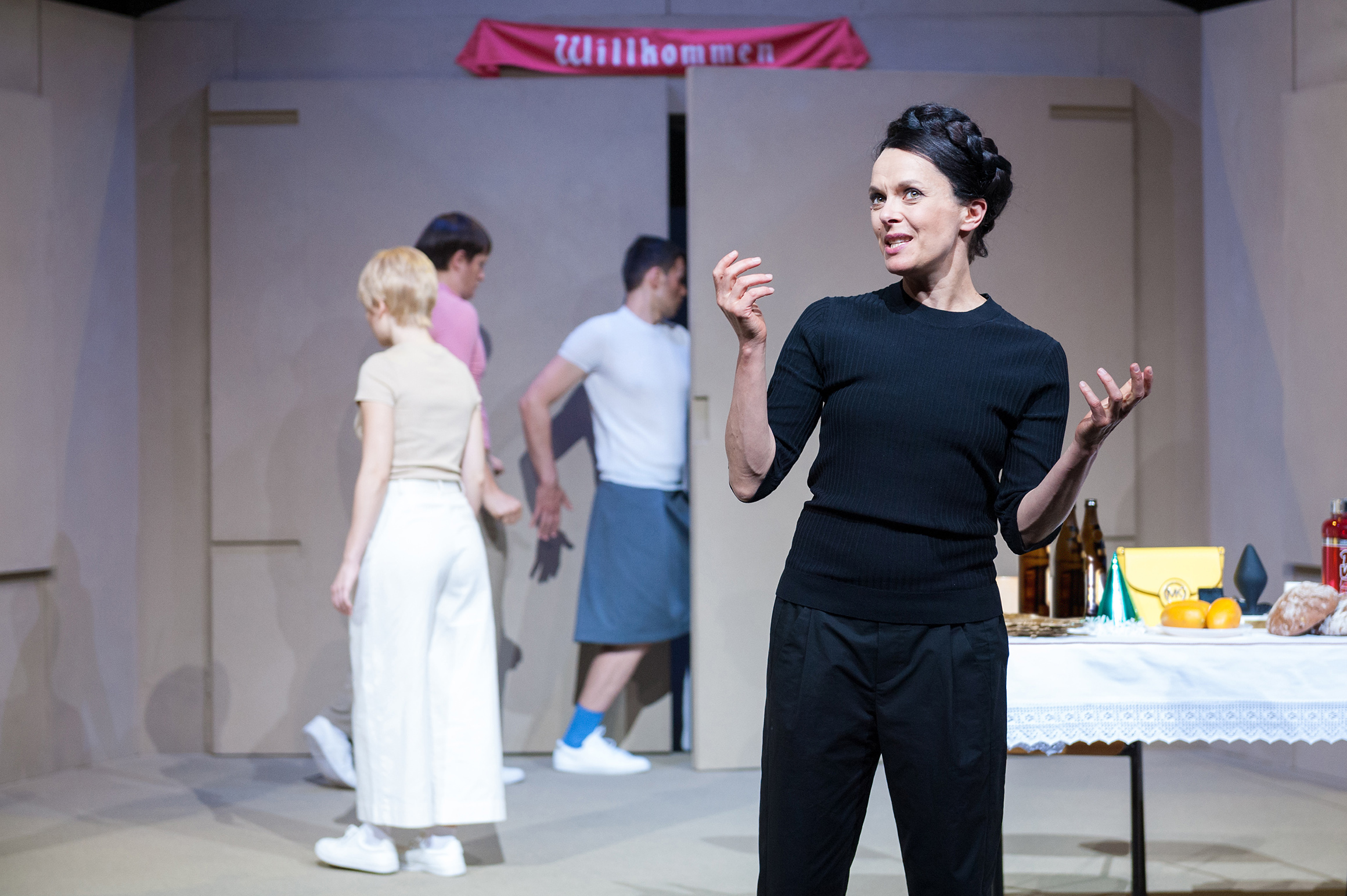20 November 2018
Originally published
22 October 2018
Source
Myth, present and future – what happens when reality swallows up the grotesque? What does a continent dream of? This question is raised by celebrated young playwright Miroslava Svolikova’s latest theatre text europe escapes to europe.
In the play, Europe dreams of itself: of a fulfilled utopia that contains justice, equality and peace. “This continent will not be soaked in blood!” is Europa’s motto. Svolikova presents the chronology of our continental history as a farce, a carnival of lies, in which the strongest wear the finest masks. Europe is a continent of ambivalence – Miroslava Svolikova’s dramatic poem comes across as a contemporary and timeless text, a narrative about European self-assurance and self-estrangement. It takes the audience on a breathless and breathtaking tour de force; images of excess and violence are blended into a colourful “carnival of actuality”. On the dance floor Europa’s children reach out to their mother. A dance of joy – and a dance of death.
Director Franz-Xaver Mayr’s second Svolikova production can be experienced in Vienna since the beginning of October. Aptly, it is showing at Burgtheater’s third venue, Kasino at Schwarzenbergplatz, where the Executive Secretariat of the Presidency of the Council of the European Union is located until the end of the year – in the second half of 2018 it’s Austria’s turn. In the following interview Miroslava Svolikova talks with Florian Hirsch about her very personal “European playlist”.

“europa escapes to europe”. Dorothee Hartinger, Alina Fritsch, Marie-Luise Stockinger, Sven Dolinski, Valentin Postlmayr, Marta Kizyma. Photo: © Reinhard Werner
Miroslava Svolikova, your previous, successful play with the seemingly never-ending and confusing title Diese Mauer faßt sich selbst zusammen und der Stern hat gesprochen, der Stern hat auch was gesagt [This wall sums itself up and the star has spoken, the star also said something] featured an actress dressed as one of the stars on the EU flag. Now you have written a new play dealing with the same subject: europa escapes to europe is a witty reflection on the past, present and future of our continent – a continent which undoubtedly seems to be rather torn these days.
Directly after die hockenden [the crouchers], that was shown in Vienna at Burgtheater Vestibül, I came up with the idea for this text. But I put it aside to write This wall … for Schauspielhaus Vienna. The last EU star also features in that play, yet the two plays are completely different.
Why is Europa escaping to Europe now?
In ancient Greek mythology a bull kidnaps Europa. In my version, though, she frees herself, killing the bull and escaping to the mainland. What particularly interested me was her very precarious and strange situation – that strange beginning, which is located somewhere really far off. You could say it’s similar to European history that originates in various different cultures, with various starting points and crossroads, full of chaos. It always seems to re-start somewhere else, referring to the past and so on.
“Reality seems to have swallowed the grotesque in an absolutely overwhelming way.”
The text is a reinterpretation of the myth. What’s so different about your Europa?
In some versions of the myth, Europa doesn’t just get kidnapped; she is also raped. To me it was clear she should strike back. Translated into the brutality of mythological storytelling this means: she kills the bull, but in a fairy-tale way, with a tip of her hair. Afterwards she proclaims the vision of a peaceful continent. On another level one could read this as the historical ambivalence of utopia and violence. In the following sequences Europa finds herself in various tableaus – that is, in historical or philosophical situations. The myth actually ends after the first scene, but the character Europa, a mythological character as well as an embodiment of an idea, remains active through the play.
There’s one line woven into the text almost like a mantra: “WELCOME TO THE CARNIVAL OF ACTUALITY.” Has the reality we’re experiencing every day become so grotesque that the only remaining option is to consider it a “carnival”?
These days, this impression is indeed very strong. In fact, we’re experiencing it while we’re right in the centre of events. Reality seems to have swallowed the grotesque in an absolutely overwhelming way. In my play, the setting is a little more historical at first. It’s more or less the “two peasants” (not “organic” Austrian farmers of today, but medieval ones) who make remarks such as: “Our life is so exhausting, having been born as peasants. All the lice and so on…” Sometimes I had to think of a cartoon showing Steve Jobs, reincarnated as a Chinese factory worker who has to put together iPhones on some assembly line.
Miroslava Svolikova
Miroslava Svolikova was born in Vienna in 1986, studied philosophy in Vienna and Paris, scenic writing at uniT Graz and at the Academy of Fine Arts Vienna. She works as a visual artist, makes music, writes dramas and texts. In 2015 she won the Retzhofer Drama Award for die hockenden [the courchers], premiered in Vestibül in 2016.
Photo: © Reinhard Werner
Is europa escapes to europe a theatre play at all? The subtitle marks it as a “dramatic poem in a series of tableaus”. What does that mean?
It means it’s not a historical treatise, even though one can associate various points in history: the major catastrophe, the Big Bang, being the two world wars for example. At the end of the day the whole thing depends heavily on the associations of the audience. My working process was a very lyrical one, strongly based on imagery. As a matter of fact, this is how I always work.
The interesting aspect about images is that you can read them in many different ways; there are many different layers. Images are collective material. In July, the Goethe Institute invited me to Tokyo, where the play was staged as a scenic reading. The shared collective knowledge of the Japanese is, of course, totally different. Their associations are different from ours. Greek mythology, a priest talking about a rib – these things are not as well known as in Europe. I very much enjoyed it, though, and some really interesting discussions took place.
If Europe were a song, a piece of music – which one would it be? I’m quite certain it wouldn’t be the Ode to Joy?
Probably a rather incoherent playlist. After that performance the DJ will never be hired again.
Where’s the more significant borderline in Europe – between North and South or West and East?
Both are significant, and even more. If you paint all borders on the map in blue you won’t see the map anymore because it disappears in the ocean.

“europe escapes europe”. In the front: Dorothee Hartinger. In the back: Alina Fritsch, Valentin Postlmayr, Sven Dolinski. Photo: © Reinhard Werner
“If no one believes in me”, Europa states in the play, “I will disappear.” Do you believe in Europe? Or is it going to disappear before next year’s Berlin Drama Festival, the Authors’ Days at Deutsches Theater, where the play was originally staged?
No, I don’t think so. We’ll somehow make it to next year’s festival. Europe, of course, is the sum of its people and constantly reinventing itself. This principle of reinvention is fundamental to Europe, I guess. And theatre, too, maybe. So … the odds are pretty good.
Can theatre, of all things, save Europe?
I don’t think it’s so bad yet. Theatre doesn’t have to run around with a first-aid kit. Just kidding. Of course, theatre must save us all!
Original in German. First published on burgtheater.at on 22 October 2018.
Translated into English by Florian Hirsch.
This text is protected by copyright: © Florian Hirsch / Burgtheater. If you are interested in republication, please contact the editorial team.
Copyright information on pictures, graphics and videos are noted directly at the illustrations. Cover picture: Miroslava Svolikova. Photo: © Reinhard Werner